
Kriangsak Chamanan served as prime minister of Thailand from 1977 to 1980. After staging a successful coup, he was asked to become Prime Minister in 1977, he ruled till 1980 and is credited with "steering Thailand to democracy" in a time where internally, communist insurgents are rampant and neighbouring countries have turned to communist rule following the communist takeover of Vietnam: South Vietnam, Laos, and Cambodia. He died on 23 December 2003, aged 86.
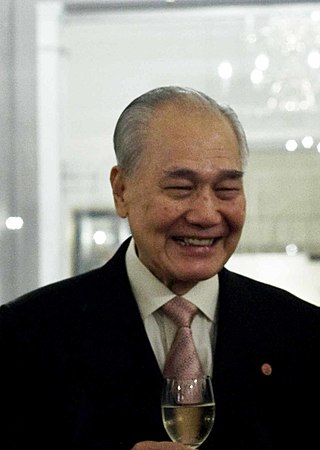
Anand Panyarachun was Thailand's Prime Minister twice: once in 1991–1992 and again during the latter half of 1992. He was effective in initiating economic and political reforms, one of which was the drafting of Thailand's "Peoples' Constitution", which was promulgated in 1997 and abrogated in 2006. Anand received a Ramon Magsaysay Award for Government Service in 1997.

The history of Thailand from 1973 to 2001 saw an unstable period of democracy, with military rule being reimposed after a bloody coup in 1976.

Prem Tinsulanonda was a Thai military officer, politician, and statesman who served as the Prime Minister of Thailand from 3 March 1980 to 4 August 1988, during which time he was credited with ending a communist insurgency and presiding over accelerating economic growth. As president of the Privy Council, he served as Regent of Thailand from the death of King Bhumibol Adulyadej on 13 October 2016, until the 1 December 2016 proclamation of Vajiralongkorn as King. At the age of 98, Prem was the longest-living Thai Prime Minister. He is also the oldest regent of any country, surpassing Bavarian Prince Regent Luitpold's record, when he became the regent for king Rama X. During the Thai political crisis of the mid-2000s, he was accused by deposed prime minister Thaksin Shinawatra and his supporters of masterminding the 2006 coup, as well as in the appointment of the post-coup legislature and interim government of Surayud Chulanont. The military junta that ousted Thaksin denied that Prem had any important political role. Prem, as the President of the Privy Council, promoted King Bhumibol's ideologies and royal projects, though he sometimes represented himself as being the voice of the king. He urged Thai society to follow the king's advice and himself founded several welfare projects related to education, drug suppression, poverty, and national unity. A southerner, Prem had also dealt personally with trying to resolve the South Thailand insurgency.

Chavalit Yongchaiyudh, also known as "Big Jiew", is a Thai politician and retired army officer. From 1986 to 1990 he was the Commander-in-chief of the Royal Thai Army (RTA), and Supreme Commander of the Royal Thai Armed Forces from 1987 to 1990. In 1990 he founded the New Aspiration Party which he led until 2002. He was Thailand's 22nd Prime Minister from 1996 to 1997. At various times he has held the positions of Deputy Prime Minister, Minister of Defence, Minister of the Interior, Minister of Labour and Leader of the Opposition.

The Most Exalted Order of the White Elephant is an order of Thailand. It was established in 1861 by King Rama IV of the Kingdom of Siam. Along with the Order of the Crown of Thailand, it is regularly awarded to any government official for services rendered to Thailand for five years, making it Thailand's most-commonly awarded order. the order features the three-headed Airavata, the mount of Sakra, or a white elephant.

The Most Noble Order of the Crown of Thailand is a Thai order, established in 1869 by King Rama V of The Kingdom of Siam for Thais, the royal family, governmental employees, and foreign dignitaries for their outstanding services to the Kingdom of Thailand. The order originally had seven classes. The special class was added by King Rama VI in 1918. Formerly called The Most Noble Order of the Crown of Siam.
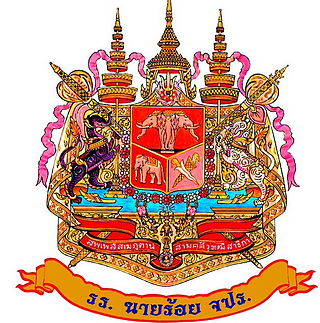
Chulachomklao Royal Military Academy (CRMA) is the service academy of Royal Thai Army (RTA). Established in 1887 it has graduated the majority of Thailand's military leaders, many of whom have become Thai prime ministers. The academy has an intense training program. There are about 200 cadets in each class.
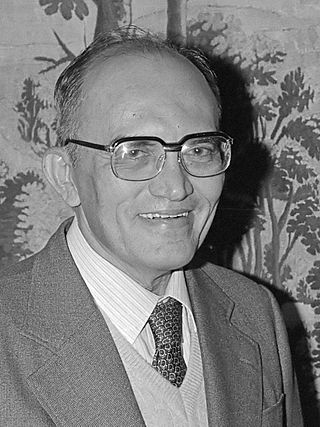
Siddhi Savetsila was a Thai air force officer and politician. After finishing his military career with the rank of air chief marshal, he served as the foreign minister of Thailand from 1980 to 1990. In 1991, he became a member of the Privy Council of King Bhumibol Adulyadej. He was the president of the united nations security council in 1985 with Mom Luang Birabhongse Kasemsri.
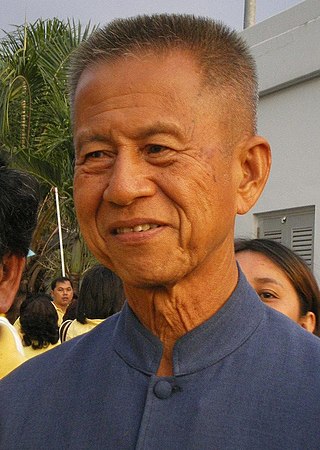
Chamlong Srimuang is a Thai activist and former politician. A former general, he was a leader of the "Young Turks" military clique, founded and led the Palang Dharma Party, served for six years as governor of Bangkok, led the anti-military uprising of May 1992, and is a prominent member of the People's Alliance for Democracy, a group strongly opposed to former prime minister Thaksin Shinawatra. Chamlong had supported the military junta that overthrew Thaksin in a coup. A devout Buddhist and follower of the Santi Asoke sect, he is now celibate, a vegetarian, and claims to have no worldly possessions. Chamlong Srimuang received the Ramon Magsaysay Award in the category of Government Service in 1992.
Pallop Pinmanee (Thai: พัลลภ ปิ่นมณี,RTGS: Phanlop Pinmani, born 25 May 1936 in Sam Phran, Nakhon Pathom as Amnat Pinmanee is a retired Thai Army general who took part in several coups, ordered the massacre of insurgents at Krue Sae Mosque and allegedly played a role in the attempted car-bomb assassination of Prime Minister Thaksin Shinawatra. After a 2006 military coup overthrew Thaksin, the military junta appointed Pallop public relations adviser to the Internal Security Operations Command of Thailand. He eventually switched sides and became an adviser to Thaksin's younger sister Yingluck Shinawatra while she was serving as prime minister.
Major General Manoonkrit Roopkachorn is a former Thai military officer, senator and President of the Senate of Thailand. A leader of the "Young Turks" clique of military officers, he took part in the coups of 1976 and 1977, in the unsuccessful coups of 1981 and 1985, and in the 2002 corruption case of Prime Minister Thaksin Shinawatra.
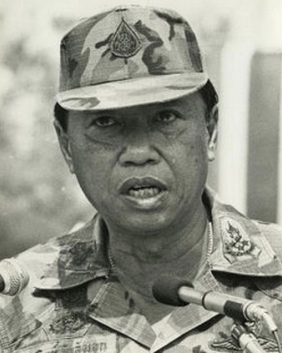
Arthit Kamlang-ek was a Thai general. He was the Commander-in-Chief of the Royal Thai Army from 1982 to 1986 and parallel the Supreme Commander of the Royal Thai Armed Forces from 1983 to 1986. He was particularly influential during the 1980s during the government of Prem Tinsulanonda.

The Constitution of the Kingdom of Thailand provides the basis for the rule of law in Thailand. Since the abolition of the absolute monarchy in 1932, Thailand has had 20 charters or constitutions, an average of one roughly every four years. Many changes followed military coups, reflecting the high degree of political instability in the country. After each successful coup, military regimes abrogated the existing constitution, generally without public consultation.
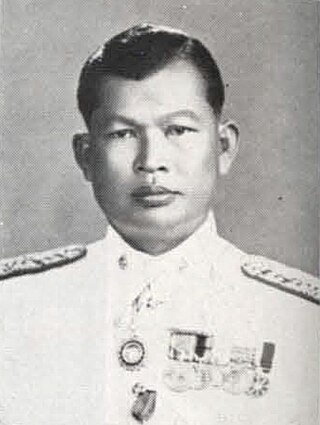
Admiral Sangad Chaloryu was a Thai admiral and politician who served as head of the National Administrative Reform Council (NARC), a military junta that ruled Thailand from 1976 to 1980.

The Honourable Order of Rama was established on 22 July 1918 by King Rama VI of the Kingdom of Siam, to be bestowed onto those who have rendered special military services either in peace or in wartime.

The 1991 Thai coup d'état was a military coup against the democratic Chatichai Choonhavan government, carried out by Thai military leaders on 23 February. Although the figure head was Sunthorn Kongsompong, there was a military influence from military leaders, Chavalit Yongchaiyudh, Suchinda Kraprayoon, and Kaset Rojananil in the conflict. Chalerm Yubamrung, a politician, was also involved in the beginning of the conflict which began since 1990 but reached the peak in February 1991 due to a strong executive order of Chatichai. Later in May 1992, protesters calling for democracy were massacred by the military regime, known as 'Black May.'
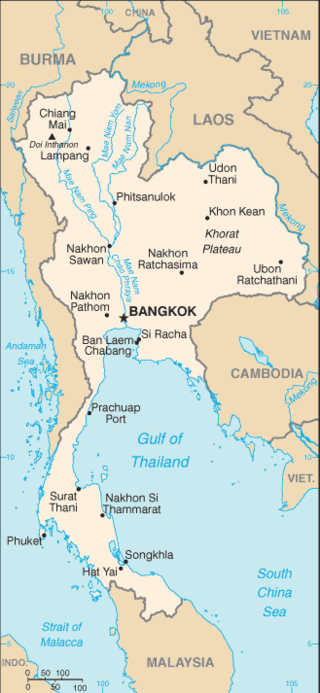
The October 1977 Thai coup d'état was a bloodless military coup which took place in Thailand on 20 October 1977, staged by the Royal Thai Armed Forces (RTAF). The coup was carried out under the nominal authority of Admiral Sangad Chaloryu of the Royal Thai Navy, head of the National Administrative Reform Council (NARC), but it was effectively led by General Kriangsak Chamanan of the Royal Thai Army, Supreme Commander of the RTAF. It led to the deposition of Prime Minister Thanin Kraivichien, who assumed the office following the 1976 coup d'état, in the immediate aftermath of the Thammasat University massacre.
The 1985 Thai military coup attempt known in Thailand as the Retired Officer rebellion, 9 September rebellion and Two siblings rebellion was a military coup attempt against the government of Prem Tinsulanonda, by former Thai military leaders on 9 September 1985, but a counter-coup by Prem government in the morning led to surrender of the coup forces.
The March 1977 Thai coup d'état attempt was a military coup attempt against the military government of Thanin Kraivichien and junta leader Sangad Chaloryu, by Chalard Hiranyasiri on 26 March 1977, but failed within 12 hours. Chalard was executed one month later without trial, in retaliation of the killing of Arun Thavathasin, close friend of King Bhumibol Adulyadej.














